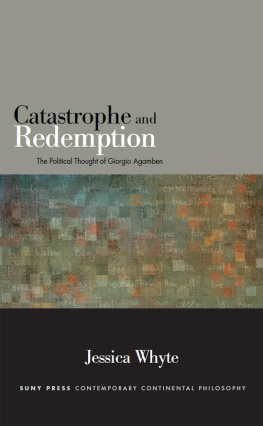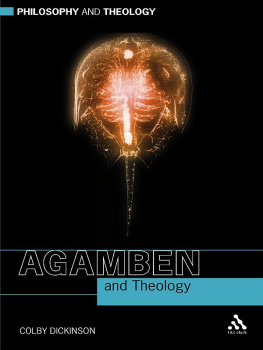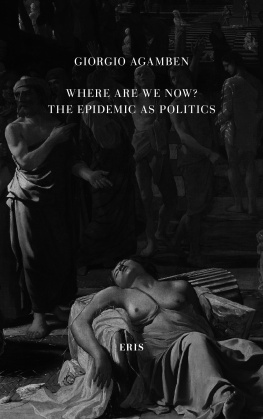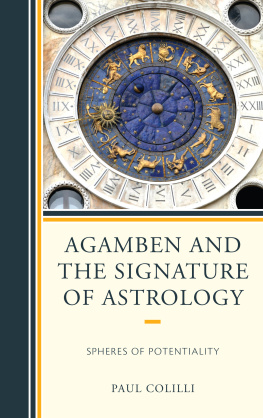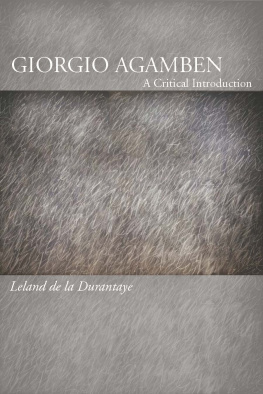SUNY series in Contemporary Continental Philosophy

Dennis J. Schmidt, editor
Catastrophe and Redemption
The Political Thought of Giorgio Agamben
JESSICA WHYTE

Published by State University of New York Press, Albany
2013 State University of New York
All rights reserved
Printed in the United States of America
No part of this book may be used or reproduced in any manner whatsoever without written permission. No part of this book may be stored in a retrieval system or transmitted in any form or by any means including electronic, electrostatic, magnetic tape, mechanical, photocopying, recording, or otherwise without the prior permission in writing of the publisher.
For information, contact State University of New York Press, Albany, NY
www.sunypress.edu
Production by Cathleen Collins
Marketing by Anne M. Valentine
Library of Congress Cataloging-in-Publication Data
Whyte, Jessica (Jessica Stephanie)
Catastrophe and redemption : the political thought of Giorgio Agamben / Jessica Whyte.
pages cm
Includes bibliographical references and index.
Summary: A striking new reading of Agamben's political thought and its implications for political action in the presentProvided by publisher.
ISBN 978-1-4384-4853-4 (hardcover : alk. paper)
1. Agamben, Giorgio, 1942Political and social views. 2. Political sciencePhilosophy. I. Title.
JC265.A34W49 2013
320.01dc23
2012048336
10 9 8 7 6 5 4 3 2 1
Acknowledgments
This book has been years in the making, and I have accumulated debts too numerous to do justice to. I would like to thank all those brilliant readers who provided critical responses to elements of it: Mark Kelly, Alison Ross, Nina Philadelphoff-Puren, Sarah Tayton, Vicki Sentas, Justin Clemens, Eve Vincent, Costas Douzinas, Liz Humphries, Nick Heron, Yoni Molad, Eric Santner, Sean O'Beirne, Craig McGregor, John Cleary, Daniel McLoughlin, Rory Dufficy. Thanks also to the two anonymous reviewers, whose helpful comments enabled me to refine the manuscript and sharpen my argument, to Andrew Kenyon and Cathleen Collins at SUNY Press, and to Rory Dufficy for his fine work on the index. Alison Ross deserves special thanks for reading numerous drafts, starting with the first one and ending with the final draft, and providing feedback that was always critical, generous, and incisive. This work has benefited immensely from conversations (and arguments) with the following friends and colleagues: Ellen Roberts, Andrew Benjamin, Thanos Zartaloudis, Bryan Cooke, Sarah Roberts, Alex Murray, Andrea Maksimovic, Dimitris Vardoulakis, Adam Bandt, Damien Lawson, Adam Nash, Amir Ahmadi, Alex Ling, Ben Golder, Ihab Shalbak, Paul Patton, Kim Mereine, Lauren Bliss, Richard Bailey, Tad Tietze, Tyson Wils, Ben Noys, Andy Schaap, Juliet Rogers, Adam Bartlett and Jon Symons. This book would literally not have been possible without the experiment in the creation of a general intellect that is the Melbourne Agamben reading group. I thank all its past and present members. Finally, I am especially grateful to Ihab, for bringing such joy to my life. This book is for my brothers, Joe and Nick Whyte, and is dedicated to the memory of Liz and Don Whyte.
A portion of the first chapter appeared as Particular Rights and Absolute Wrongs: Giorgio Agamben on Life and Politics, Law and Critique (2009, 20:2), 147161. An earlier draft of the third chapter appeared as I Would Prefer Not To: Giorgio Agamben, Bartleby and the Potentiality of the Law, Law and Critique (2009, 20:3), 309324. An early draft of a portion of the final chapter appeared as A New Use of the Self: Giorgio Agamben on the Coming Community, Theory and Event, vol. 13:1 (2010), http://muse.jhu.edu/login?uri=/journals/theory_and_event/v013/13.1.whyte.html.
Introduction
On Catastrophe and Redemption
This is forgetfulness: that you remember the past and not remember tomorrow in the story.
Mahmoud Darwish, This Is Forgetfulness
In March 2009, Giorgio Agamben gave an address inside the Notre-Dame Cathedral in Paris. In the audience were a number of high-ranking Church officials, including the Bishop of Paris. Although his talk has been described as a homily, its content was far from edifying. An evocation of final things, of ultimate things, has so completely disappeared from the statements of the Church, he told the assembled listeners, that it has been said, not without irony, that the Roman Church has closed its eschatological window.
In this depiction of the permanence of the liberal capitalist present as hellish, we see the immense gap that separates Agamben from the liberal consensus that shaped the period in which many of his major works were written. The unexpected fall of the Berlin Wall and rapid collapse of the Soviet Bloc gave rise to a form of liberal utopianism that was most starkly expressed in Francis Fukuyama's The End of History and the Last Man. In that book, which now has the feel of a relic from a bygone (post)-historical era, Fukuyama argued that despite the horror of the twentieth century, good news has come in the form of the demise of totalitarianism and the ascendancy of liberal democracy as the only coherent political idea with global reach.
This liberal utopianism was a paradoxical onemore a sigh of resignation in the face of the failures of previous, more compelling, utopias than a promised land. Although even Fukuyama was unable to stifle a note of anxiety about whether such a posthistorical condition could actually make us happy, the purchase of his thought relied on its ability to capture a zeitgeist marked by the foreclosure of such anxieties, and the promise of happiness they recalled, and the affirmation of the eternal and uninterrupted continuation of the liberal democratic present. In stark contrast, for Agamben, it is this transformation of the liberal-capitalist present into an infinite horizon that is truly infernal.
Before long, it became clear that liberal capitalism had not produced the irrepressible movement toward a world of peace and democracy that had been proclaimed in the wake of the fall of the wall. Agamben's thought was particularly suited to analyzing the transformations the demise of the Soviet Bloc wrought on those liberal democratic states that Fukuyama had portrayed as the victors of the ideological battle against totalitarianism. By the time Homo Sacer: Sovereign Power and Bare Life appeared, with its striking claim that today it is not the city but rather the camp that is the fundamental biopolitical paradigm of the West, By 2005, when State of Exception was published in the midst of the War on Terrorwhich saw the declaration of a state of emergency, the suspension of a host of basic rights and the utilization of Guantnamo Bay as an interrogation camp in which so-called enemy combatants were placed outside the reach of the U.S. court systemAgamben's analysis of our time seemed disturbingly prescient.
More than a decade later, it is clear that while the early reception of his explicitly political works was bound up with the events that seemed to confirm his central theses, the descriptive value of his thought was double-edged: while it led to enormous interest in his work across a range of disciplines, it tended also to obscure the underlying philosophical claims about the nature of Western politics and metaphysics that provided the horizon of intelligibility for his more provocative arguments. Furthermore, it led to a one-sided focus on

